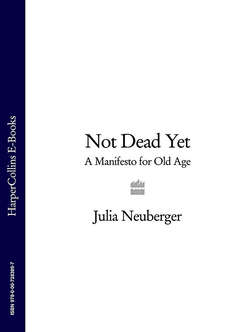Not Dead Yet: A Manifesto for Old Age

Реклама. ООО «ЛитРес», ИНН: 7719571260.
Оглавление
Julia Neuberger. Not Dead Yet: A Manifesto for Old Age
Not Dead Yet
Contents
Dedication and acknowledgements
Introduction
The manifesto
1 Don’t make assumptions about my age: end age discrimination
2 Don’t waste my skills and experience: the right to work
3 Don’t take my pride away: end begging for entitlements
4 Don’t trap me at home because there are no loos or seats: reclaim the streets
5 Don’t make me brain dead, let me grow: open access to learning
6 Don’t force me into a care home: real choice in housing
7 Don’t treat those who look after me like rubbish: train and reward care assistants properly
8 Don’t treat me like I’m not worth repairing: community beds and hospitals
9 Don’t treat my death as meaningless: the right to die well
10 Don’t assume I’m not enjoying life, give me a chance: grey rage
Notes. Introduction
Don’t make assumptions about my age
Longer lives
Healthy life expectancy
Different definitions
Life satisfaction and well-being
The tyranny of a definition
Where we go wrong
Call to arms
Notes. Chapter 1
Don’t waste my skills and experience
Work
Official efforts
What kind of work?
Age discrimination
Volunteering
Barriers to volunteering
Call to arms
Notes. Chapter 2
Don’t take my pride away
Poverty
Confusion about money
Real poverty
Fuel poverty
Retirement income
The demographic ‘time bomb’
Financial products
State pensions
The UK and other countries
The UK debate
Call to arms
Notes. Chapter 3
Don’t trap me at home because there are no loos or seats
Public toilets
Public spaces
Crime
CCTV
Parks and urban green spaces
Transport
Shops, shopping centres and markets
Technology and telecare
Call to arms
Notes. Chapter 4
Don’t make me brain dead, let me grow
Informal learning
Libraries
Formal learning
Dance
Internet and computer games
Outward bound
Being unfit and isolated
Intergenerational activities
Call to arms
Notes. Chapter 5
Don’t force me into a care home
Heating and repairs
Improvement services
Adaptations at home
Moving house
Housing choice
Lifetime homes
Ghettoization
New models
Call to arms
Notes. Chapter 6
Don’t treat those who look after me like rubbish
Care provision
Care funding solutions
Care homes
Poor care
Care home closures
Care workers
Divided couples
Pain relief
Good care
Food
Dignity in care
Call to arms
Notes. Chapter 7
Don’t treat me like I’m not worth repairing
Rationing and ageism
Bed blockers and re-admissions
Policy responses
Mental health
Other mental problems
Policy solutions
Home care for people with dementia
Depression
Poor hospital care
Food
Call to arms
Notes. Chapter 8
Don’t treat my death as meaningless
Facing death clearly
Sorting things out
Good dying
Patient autonomy
Teach medical staff
Define a good death
Call to arms
Notes. Chapter 9
Don’t assume I’m not enjoying life, give me a chance
Coming alive in old age
Reflection
Politics
Notes. Chapter 10
Notes. Introduction
Chapter 1
Chapter 2
Chapter 3
Chapter 4
Chapter 5
Chapter 6
Chapter 7
Chapter 8
Chapter 9
Chapter 10
Bibliography
Index
Also by Julia Neuberger
Credits
Copyright
About the Publisher
Отрывок из книги
I could not have written this book without the extraordinary help and support of Ros Levenson, whose idea it was in part, who conducted much of the research, argued with me, briefed me, and generally helped me make it happen. Nor would it have been possible without the dedicated work of David Boyle, who took an unedited sprawling text and turned it into English – not to mention into manageable prose – as well as arguing through some of it at a late stage, and clarifying my ideas considerably. The team at HarperCollins has been supportive as ever – without Carole Tonkinson, Natalie Jerome, Jane Beaton and Belinda Budge, this volume would never have seen the light of day.
Huge thanks are due to my agent Clare Alexander, as well, dispenser of wise advice, firm encouragement, superb ideas, and lots of wine and sympathy, and to my assistant Paola Churchill, referred to by my whole family as ‘my boss’, because she tells me what I have to do, including finishing this book.
.....
In fact, the pre-election period before the May 2005 election put older people on the political agenda for the first time. But they were neither sufficiently high on the agenda, nor taken seriously enough. It was also a disappointment to find that, despite the Conservatives’ attempt to raise it, the pensions issue never really took off as central to the election campaign. Nor did long-term care, which has been a source of such resentment for many people; or even palliative care. All the parties said they would spend more, but no one said – as they should have done – that palliative care would be available for everyone who was dying, whatever condition was leading to their death.
But to start to use this latent consumer and political power we are going to have to deal with a whole range of hurdles. The media tend to go for stereotypes at the extreme – either the parachuting granny (isn’t she amazing!) or the helpless and neglected old dear (what a tragedy!). For most of us, most of the time, we are neither parachuting, nor helpless – though some of us will have some time experiencing both phases. We need to find ways of breaking out of the traps that the stereotypes represent.
.....